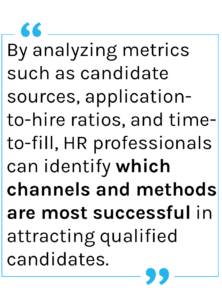It’s time to start leveraging data to improve your recruitment strategy.
In today’s competitive higher education landscape, attracting and retaining top talent is more challenging than ever. Fortunately, data can be a powerful tool to inform and improve your recruitment strategy. By leveraging data analytics, HR professionals in higher education can make more informed decisions, target the right candidates, and ultimately, enhance the quality of their hires. In this blog post, we will explore how data can be used to refine recruitment strategies in the higher education sector.
The Power of Data in Recruitment
Data analytics can provide valuable insights into the effectiveness of your recruitment efforts. By analyzing metrics such as candidate sources, application-to-hire ratios, and time-to-fill, HR professionals can identify which channels and methods are most successful in attracting qualified candidates. This information can help in allocating resources more effectively and focusing on the most productive recruitment strategies.
 Utilizing Predictive Analytics
Utilizing Predictive Analytics
Predictive analytics can be particularly valuable in higher education recruitment. By analyzing historical data on successful hires, predictive models can be used to identify the characteristics and qualifications that are most likely to lead to a successful hire. This can help in creating more targeted job descriptions, screening criteria, and interview questions, leading to a more efficient and effective recruitment process.
Enhancing Diversity and Inclusion
Data can also play a crucial role in promoting diversity and inclusion in recruitment. By tracking and analyzing demographic data throughout the recruitment process, HR professionals can identify potential biases and disparities. This information can be used to implement targeted strategies to attract a more diverse pool of candidates and ensure a fair and inclusive recruitment process.
Leveraging Technology
In the digital age, there is no shortage of tools and technologies to help HR professionals collect and analyze recruitment data. Applicant tracking systems, job board analytics, and candidate relationship management platforms are just a few examples of the technologies that can provide valuable data insights. By leveraging these tools, HR professionals can make more data-driven decisions and continuously refine their recruitment strategies.
Final Thoughts
In conclusion, data can be a game-changer in the higher education recruitment landscape. By harnessing the power of data analytics and predictive models, HR professionals can make more informed, efficient, and inclusive recruitment decisions. As the competition for top talent continues to intensify, those who embrace data-driven recruitment strategies will be best positioned to attract and retain the best and brightest in their fields.